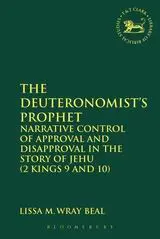

The Deuteronomist's Prophet: Narrative Control of Approval and Disapproval in the Story of Jehu (2 Kings 9 and 10)
in Library of Hebrew Bible/Old Testament Studies
Pages
240
Publisher
T&T Clark
Published
2007
ISBN-13
9780567017529
This book explores, by way of narrative analysis, the story of Jehu's revolt in 2 Kings 9 and 10, and the tensions and ambiguities surrounding the evaluation of Jehu that it contains. In the narrative, the Deuteronomist writes in many voices: the prophet(s), the Lord, the narrator, even Jehu himself. The tension within the Jehu narrative arises in the interaction of the various voices, and careful study of these narrative voices reveals two primary criteria for evaluating Jehu: (1) faithful observance of correct Deuteronomistic worship, that is, true Yahwistic worship in the Jerusalem Temple; and (2) faithful obedience to the prophetic word. Each criterion is expressed in the narrative and, as a means of finally resolving the ambiguity of the evaluative voices, the narrative presents the criterion of worship in supersession over the criterion of the prophetic word.
The narrative analysis shows how the Jehu narrative connects linguistically, thematically, and analogically to the larger Deuteronomistic History and provides rubrics under which a Deuteronomistic theology of kingly legitimation can be examined. The theology that arises from the Jehu narrative in respect of kingly legitimation, traced through the criteria of proper worship and the prophetic word, at times adds unique emphases to the theology of kingly legitimation presented in the history. At other times, it stands seamlessly with the theology of the larger history. At all times, the theology of worship and word shows the Jehu narrative ultimately cannot be read successfully or fully in isolation from the surrounding text and the theology presented there.
Chapter Two: Methodology
Chapter Three: Overview of Treatment of Prophetic Narratives Within the Deuteronomistic History
Chapter Four: Narrative Analysis-2 Kings 9
Chapter Five: Narrative Analysis-2 Kings 10
Chapter Six: Worship and Word: Jehu and Deuteronomistic Theology
Chapter Seven: Conclusion
Table One
Epilogue
Bibliography
The narrative analysis shows how the Jehu narrative connects linguistically, thematically, and analogically to the larger Deuteronomistic History and provides rubrics under which a Deuteronomistic theology of kingly legitimation can be examined. The theology that arises from the Jehu narrative in respect of kingly legitimation, traced through the criteria of proper worship and the prophetic word, at times adds unique emphases to the theology of kingly legitimation presented in the history. At other times, it stands seamlessly with the theology of the larger history. At all times, the theology of worship and word shows the Jehu narrative ultimately cannot be read successfully or fully in isolation from the surrounding text and the theology presented there.
- Table of contents
- Chapter One: Introduction
- Excursus: Personal Theological Commitments and the Task Undertaken
- 2.0 Introduction
- 2.1 Methodology
- 2.2 Methodology in the Broader Context of Literary Scholarship
- 2.3 Working the methodology in the Jehu narrative
- 3.0 Introduction
- 3.1 Historical-Critical Beginnings
- 3.2 Pre-Dtr Prophetic Sources
- 3.3 Pre-Dtr Sources Examined by Form-Critical Methodology: The Prophetic Narratives as Folktales and Legends
- 3.4 DtrG and a Subsequent Prophetic Redaction
- 3.5 Prophetic Narratives Read Holistically Within the History
- Scene One The Commission of the Young Prophet (9:1-4)
- Scene Two The Anointing of Jehu (9:5-10)
- Excursus: Repetition and Discrepancy in the Prophetic Word (9:6-10)
- Scene Three Jehu's Acclamation (9:11-16)
- Scene Four Jehu's Ride to Jezreel (9:17-20)
- Scene Five and Scene Six Elijah's Word at Naboth's Field; Judgment Against Jehoram and Ahaziah (9:21-29)
- Scene Seven Jezebel's Death and the Word of the LORD (9:30-37) 131
- Scene One and Scene Two Jehu's Two Letters (10:1-8)
- Scene Three Jehu Before the People (10:9-11)
- Scene Four The Relatives at Beth-eked (10:12-14)
- Scene Five Jehu's Zeal for the LORD (10:15-17)
- Scene Six The Sacrifice at the House of Baal (10:18-28)
- Part One - The Preparation of the Sacrifice (10:18-24)
- Part Two - The House of Baal is Eradicated (10:25-28)
- Scene Seven The Final Word on Jehu (10:29-33)
- Epilogue The Conclusion of the Reign (10:34-36)
- 6.0 Introduction
- 6.1 2 Kings 9 and 10-Its Contribution to a Deuteronomistic Theology of Worship
- 6.1.1 Šalôm and Jehu
- Excursus: Initial Exploration of the Meaning of Šalôm
- 6.1.2 Contrasted and Completed Characters: Analogies of Worshiping Kings
- 6.2 2 Kings 9 and 10-Its Contribution to a Deuteronomistic Theology of the Prophetic Word
- 6.2.1 The Inevitability of the Prophetic Word
- 6.2.2 The Control of the Prophetic Word